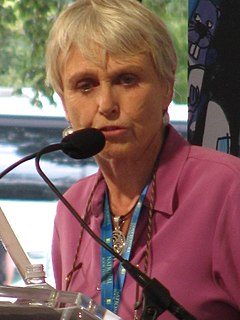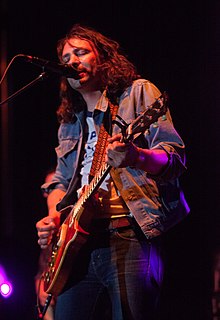A Quote by Neil deGrasse Tyson
My goal is not to shove information into your head. It's to find ways to reignite the curiosity that we all had as children for the natural world. You don't have to tell a child to explore the backyard.
Related Quotes
Don't get in the way of children who find it natural and obvious to explore the world around them - even if it means they make a mess of your kitchen or living room. It's all about your perspective on these things. Let them play. When you do, the kids do not have to be reintroduced to ways of questioning nature, and the task of promoting science would be a trivial exercise.
I had an indefatigable curiosity about everything. But why should my fate have depended upon that? Why does the curiosity of a child born into the lowest classes have to overcome everything put in his or her way to mute that curiosity, when a child born to parents with access to the advantages of life will have his meager curiosity kindled and nurtured? The unfairness is horrifying when it is properly understood as an unfairness meted out on children, on infants, on babies.
If you want your children to relate to the culture you live in, if you want to train them outside of the general system, you have to tell your children that ordinary children tend to say things like 'I can run faster than you; I can draw better than you; I know things you don't know'. You have to tell them what normal children are like. Normal children are messed up and you have to tell them about that. But if you instruct your child in high correlation with the physical world, they won't be able to relate with normal children. Normal means mixed up as I use the word.
While I was writing the book, one of my children was diagnosed with dyslexia. Dyslexia is a very tiny word for a wide-ranging neurological condition that affects different people in different ways. But I was reading an awful lot about it, to try and find ways of helping my child. I think a lot of fiction comes from this desire to confront unanswerable questions, and it's heartbreaking to see your child, a bright child, struggling so much with something that others are finding so easy. It's such an assault to the child's self-esteem and, as a mother, it's hard to watch.
Children, be curious. Nothing is worse (I know it) than when curiosity stops. Nothing is more repressive than the repression of curiosity. Curiosity begets love. It weds us to the world. It's part of our perverse, madcap love for this impossible planet we inhabit. People die when curiosity goes. People have to find out, people have to know.
If you share information widely, but you present that information in ways that fits your own view, you're actually still misrepresenting. So instead what you should do is figure out ways to build systems that allow people to experience and classify their information in ways that are meaningful for them.
Adults follow paths. Children explore. Adults are content to walk the same way, hundreds of times, or thousands; perhaps it never occurs to adults to step off the paths, to creep beneath rhododendrons, to find the spaces between fences. I was a child, which meant that I knew a dozen different ways of getting out of our property and into the lane, ways that would not involve walking down our drive.
When we are children, we have a tranquil acceptance of mystery which is driven out of us later on, by curiosity and education and experience. But it is possible to find one's way back. With affection and respect, I disagree totally with Penelope Lively's conviction about the 'absolute impossibility of recovering a child's vision.' There _are_ ways, imperfect, partial, fleeting, of looking again at a mystery through the eyes we used to have. Children are not different animals. They are us, not yet wearing our heavy jacket of time.
I love when people will say, "Oh, my songs are my children." I understand that, but I'm also not afraid to kill my kids. I know when the time has come to throw it in the trash can. With a child you've got to go to therapy and put it in daycare and buy it birthday presents. With a song, you can shove it in a dark closet and tell it you'll be there when you're ready.



































